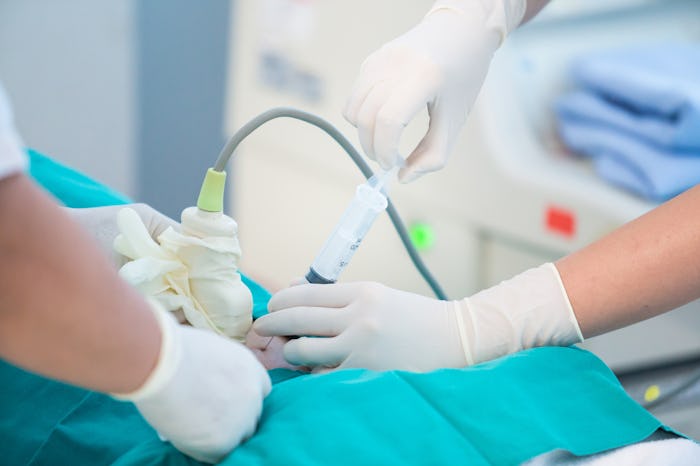Life

10 Moms Describe What Amniocentesis *Actually* Feels Like
When I found out I was pregnant I had a slew of questions, like what does labor and delivery feel like? What does a fetus kicking feel like? I never thought to wonder what an amniocentesis feels like, though. For so many of us, we don't consider what these prenatal procedures might be like... until we have to.
Amniocentesis is a test done on pregnant people, usually between 15 and 20 weeks of pregnancy, to help determine fetal health, as described by the Mayo Clinic. It consists of using a large needle to penetrate the patient's abdomen and uterus in order to extract a sample of amniotic fluid that surrounds the growing fetus. This fluid contains fetal cells, which can be used to test for genetic diseases or paternity, or assess lung maturity or infection. While there are risks to the procedure, including (but not limited to) needle injury to your fetus or even miscarriage, it is largely considered safe. Data from the Centers of Disease Control and Prevention (CDC) show the risk of miscarriage after amniocentesis is less than .5%. (Furthermore, a 2015 recent study published in Obstetrics & Gynecology suggests that amniocentesis may, in fact, pose no risk of miscarriage at all.)
Amniocentesis is generally not a routine test for all pregnant people — it's done because of specific concern, like inherited disease or abnormal ultrasounds. As you can imagine, "specific concern" and "pregnancy" is not a happy combination. The idea that I might require the procedure was so far from my mind when I got pregnant that I didn't delve too much into the specifics. (Also, the idea of a very large needle penetrating my uterus was enough to put me off reading any more than I had to.) But when blood work came back showing that both my husband and I were carriers for cystic fibrosis — an incurable, life-threatening genetic disease —I was advised to schedule the procedure in order to rule out the illness... or prepare for it.
My story turned out well. Statistics were, mercifully, on my side. But the procedure itself, while ultimately helpful, was pretty harrowing. In and of itself, it's no picnic (I repeat very large needle) but it was really the combination of worry and the physical that made it so tough. But I'm one person. What do other people have to say about their experiences? Read on:
Bridget
"[My husband] held my hand ... I didn’t pretend I could handle this on my own. What I remember most from the amnio was the warmth in [my husband's] hand. It just felt soothing."
Rachel
"I don’t remember much about the actual procedure, other than that it was nerve-wracking, but I remember being surprised at the aftermath. I got a huge bruise and my abdomen area felt like I had been punched in the gut—hard—for several days."
Marie
"Amniotentesis ... wasn’t a good story for me. It happened after the geneticist told me my 20-week-long pregnancy was most likely going to end in a non-viable baby (death after a few days if born) because of trisomy 13. After two previous miscarriages, it was heartbreaking. So they did an amnio to make sure. I cried the entire time, and even though the numbed me, it hurt like hell."
Marissa
"I had an amnio done at 23 weeks with my daughter. During the procedure, I opted to watch it on the sonogram. The needle was long and I felt a pretty unique type of pinching and cramping and a lot of pressure. It was a throbbing type of pinch. It did not last long and it was helpful that the doctor talked me through every step. Afterwards, I was sore at the needle site for a few days."
Sue
"I had one for each of my kids. I don’t remember it hurting a lot but being nervous about the long needle going in. Fortunately? I watched it on a monitor. The outcome was favorable on both accounts."
Zimra
"I remember being incredibly nervous, and not wanting to look at the monitor at all. It was all over pretty quickly, just a feeling of being uncomfortable and trying to stay so still. The best part was when it was over my doctor told me to go home and have a glass of wine to relax!"
"Alice"
"I was a wreck. Thank God it all turned out fine, but I'll never forget how scared I was that the baby we already loved so much would be born so sick. The physical part was mildly painful but the psychological aspect was so much worse. Afterwards I just crashed on my couch. I was so emotionally drained it affected me physically."
Martha
"I don’t remember it hurting, I just remember that the monitor was a black space and then suddenly something swooshed in. The doctor told me fetuses do that all the time. So freaky. And I was convinced she would have damage to her hand because of it."
Heather
"You feel the needle go into your belly, which hurts, but just as soon as you've made peace with that you feel it go through your uterus, which hurts and is so weird! It's a part of your body nothing has ever touched before! It was a very strange sensation."
Christine
"The amnio itself was no big deal. It barely hurt at all and I felt fine afterwards. Worrying about my baby was so much worse and more painful!"
Studies referenced:
Wulff, C. B.; Gerds, T.A.; Rode, L.; Ekelund, C. K.; Peterson, O. B.; Tabor, A.; the Danish Fetal Medicine Study Group (2015). Risk of fetal loss associated with invasive testing following combined first‐trimester screening for Down syndrome: a national cohort of 147 987 singleton pregnancies, Obstetrics & Gynecology, https://obgyn.onlinelibrary.wiley.com/doi/full/10.1002/uog.15820
This article was originally published on